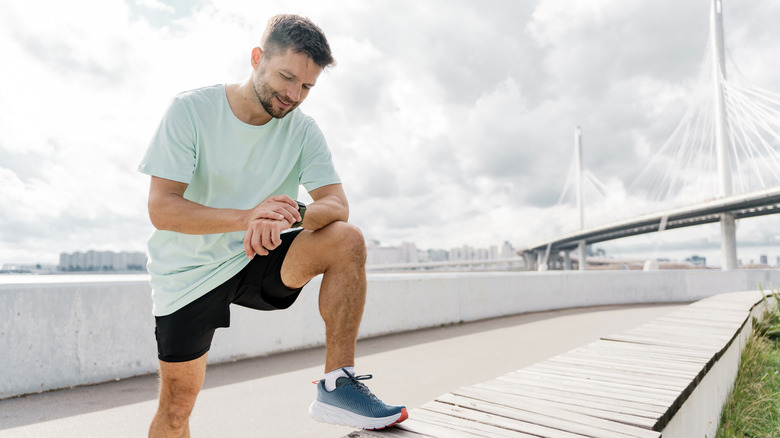When your coach asks you to hold a plank for a minute, it may seem like time is moving very slowly. You keep making small changes—raising your hips, but not too much—to ensure you’re engaging your core muscles that help stabilize your body. Your fingers could be gripping the floor, as if trying to distract yourself from the pain.This is actually what occurs when you do planks daily.)
The sensation of time slowing down during challenging workouts is not just a figment of your imagination. A2024 studyResearch in Brain and Behavior revealed that your perception of time can indeed change. During intense physical stress, your brain activates your senses to a higher level. You begin to take in a large amount of information about your body and environment simultaneously, which can make a few seconds seem much longer. You also become more aware of the passage of time, drawing your focus into the present moment. This heightened awareness can create the feeling that time is moving slowly.
Does exercising with a friend or rival make time pass faster? Not really. The same research showed that individuals who participated in a cycling competition with the aim of winning performed better, yet they still felt time was moving slowly.
Tolong support kita ya,
Cukup klik ini aja: https://indonesiacrowd.com/support-bonus/
Read more: Unexpected Ways Your Body Evolves With Age
The More Intense, The More Time Distortion

During intense physical activity, your body releasesthe hormone cortisolto assist you in preparing for stress. From an evolutionary standpoint, this is your sympathetic nervous system providing you with the energy and motivation to act, similar to fleeing from a perceived danger. Even during intense or perilous situations, time may seem to slow down.
The time trial cycling research discovered that this altered perception of time can happen even if the level of exertion changes. Put differently, participants worked harder when they were encouraged to beat an opponent, yet their feeling of time slowed down equally as much as it did during a solo time trial without any competition.
Even though that specific study did not examine time distortion during less demanding activities, other studies have shown that the greater the intensity, the more your perception of time is altered. A2020 studyIn the Journal of Strength and Conditioning Research, trained runners performed 30-minute treadmill sessions at “somewhat hard,” “hard,” and “very hard” levels, determined by their perceived exertion (RPE). During the most intense workout, the runners felt that time moved more slowly compared to when they exercised at lower intensities.
You might have experienced this time distortion during a challenging HIIT session.2017 studyIn Physiology and Behavior, the sense of time in recreational exercisers was examined during a 30-second maximum cycling sprint. As the interval progressed, participants experienced time as moving more slowly. The study also observed this phenomenon during a 20-minute rowing session. At the highest level of intensity, time appeared to slow down more toward the end of the 20 minutes compared to less strenuous sessions.
How This Temporal Distortion Can Impact Your Exercise Routine

There’s a reason you might require a watch or a coach to track the duration of your planks. You may believe you’ve held the position for a minute when it’s actually only been 30 seconds. This distorted sense of time can also occur during challenging races orexcessive high-intensity interval training. Although having rivals or exercise partners may distract you enough to work harder, it could also have the opposite effect if your objective is to achieve a personal record.
If you’re someone who exercises occasionally and wants to have fun during your sessions, extremely intense workouts may not be the best choice. That doesn’t imply you can’t push yourself. A study with runners showed that working out at a “moderately hard” level—RPE of 13—did not affect the sense of time passing. This level of exertion could make the experience more enjoyable and help you remain committed, as you won’t be as focused on the physical and mental stress associated with higher intensity levels.
Your attitude towards physical activity affects how quickly time appears to move. If you dislike working out or find it uncomfortable, it will seem to take longer. Similarly, monotony can have the same effect. The setting in which you exercise also plays a role. Exercising in high temperatures can make the same level of exertion feel more challenging, making time feel extended. This is why focusing on your perceived effort rather than speed or number of repetitions can lead to a more enjoyable and long-term fitness routine.
Read the original article on Health Digest.







